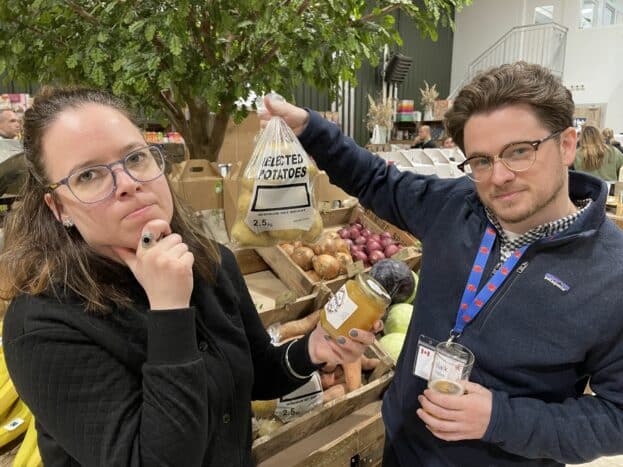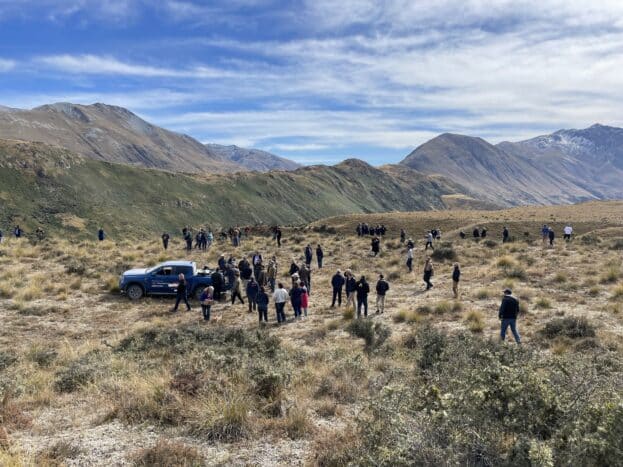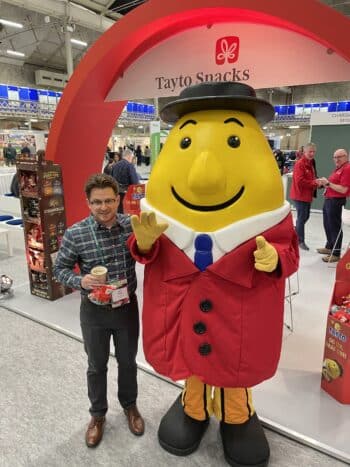Through his Nuffield Scholar studies, Mark Phillips was able to learn how to better work with consumers to build trust in ag.
When Mark Phillips started his Nuffield Scholar journey two years ago, he had just started considering public trust in his work but was determined to learn more. He applied to the agricultural research scholarship to study the issues producers face with respect to developing public trust and how to work with the general public to foster an understanding of agricultural practices and the reasons behind them.
The Nuffield Scholar program wasn’t a new concept to Phillips. Years before he had watched his boss at the Prince Edward Island Potato Board, General Manager Greg Donald, complete his own Nuffield studies. That helped push Phillips to apply for the scholarship himself.
“We’re all facing massive challenges all the time. It’s reassuring to see when you travel around that other areas have similar challenges — or even bigger challenges and some of them have withstood them. Some of the things that we fear coming down the pipeline people are already dealing with,” Phillips, marketing specialist at the P.E.I. Potato Board, says in a phone interview.

Through his studies, Phillips was able to travel the globe with stops in the United Kingdom, the Netherlands, Belgium, Ireland, New Zealand, Kenya and Chile. He also had an unplanned stop in Turkey and travelled a bit throughout North America.
During his travels he found himself learning about the rural/urban divide. One of the instances he recalls is when he spent time with a fellow Nuffield Scholar Anna Jones. Jones is a BBC journalist in the United Kingdom who has found herself stuck in the middle between the rural and urban worlds.
“She lived in in urban areas, but always travelled back home to her family farm and just felt like she was kind of stuck in the middle of relating to farmers and what their challenges are, while also seeing the urban perspective on it. And she found as time went on that divide became greater,” Phillips explains.
Phillips relates to Jones’ experience. Back in his home province of P.E.I. the number of potato farms has decreased, leaving fewer Islanders having a personal connection to the agriculture world.
“All of a sudden, questions that might not have been asked a few years ago (are being asked),” he adds. “Now (people on the Island) don’t have that direct connection to farming. They’re kind of wondering what it is we do. And we don’t maybe do as good a job explaining that as we could because it wasn’t as big of an issue years ago.”

As he looked closer at the rural/urban divide, Phillips began to realize those working in agriculture need to work to help bridge the gap. But he found educating consumers may not be the answer.
“People will want to know about your product if you give them a reason to do so. If you can engage with people rather than trying to educate them and find reasons for them to care, it’s a lot more productive,” Phillips says.
He points to the Amazon Prime show ‘Clarkson’s Farm’. On the show, former Top Gear TV show host Jeremy Clarkson shares the struggles he faces trying to run a farm he owns in the United Kingdom.
“Few people want to just sit down and watch a 30-minute program on the highs and lows of agriculture in the UK. But certainly, put a celebrity in front of it and then people end up watching something for entertainment and inadvertently learn along the way without realizing it,” Phillips says.
Phillips also found himself learning about the difficulties of balancing the economic and environmental components of agriculture. There’s currently a lot of discussion and marketing campaigns focusing on sustainability in agriculture. However not all these sustainability campaigns consider the economics of agriculture.
“A saying I heard a lot in New Zealand was ‘It’s hard to farm green when you’re in the red.’ Having more farmers involved in those conversations, there’s a lot more opportunity to come up with successful metrics to work towards sustainability,” Phillips explains.

Another aspect of agriculture that could be harming the industry as whole Phillips found during his studies was competitive marketing campaigns. For example, sometimes organic products will be marketed as being “better” than conventional, which can cause consumers to start doubting conventional farming.
“The same approach doesn’t really exist with large brands, like Nike or Adidas. Nike doesn’t start their basketball shoe ad with, ‘You’re not going to break your ankle wearing these shoes which you might do with Reebok.’ Basically, just casting doubt on the other product and saying how bad it is,” Phillips says, adding these companies will instead focus on highlighting the positives of their product without casting doubt on their competitors.
However, some agricultural marketing focuses on what the product is not, Phillips says. He explains that by doing this it can cause people to feel uncomfortable when they aren’t able to buy that premium food product they had before — this can create distrust of agriculture as a whole.
There are ways to reach consumers though and create trust though, Phillips found. In agriculture there can be a tendency to preach to the choir by being part of events or online communities with others who work in ag. Phillips instead recommends that to reach consumers those working in ag should be focus on taking part in events and promotions that may not typically feature agriculture.
In Ireland, Phillips was able to take in an event called Bloom that draws over 100,000 people annually. Bloom originally started as a flower show but has since grown to include a food component.
“People aren’t going to Bloom to learn about farming or experience food or discuss anything to do with food production in Ireland. But it’s become a big component of the festival. They go to the flower show because it’s kind of an Instagramable event everyone wants to be a part of and then they kind of unintentionally learn along the way about things like their Origin Green program, which is Ireland’s agricultural sustainability program,” he explains.
Ireland’s Origin Green is an established program that explains sustainability to consumers and includes branding on food products. The program is another aspect Phillips’ thinks those in North American ag could take away from their Irish counterparts. To help create trust with consumers there needs to be a standardized way to measure and explain sustainability goals.
“Consumers probably aren’t going to be just content with you saying your product is sustainable going forward. They’re going to want to know why and how,” Phillips explains. “If we stay on top of messaging, continue to reach out to the public and engage with them, we’ll have a lot better luck if there were something that were to go wrong. Because the public know our motives, they know we’re working to protect the land and pass it on to future generations.”
Fellow P.E.I. resident and past Nuffield Scholar Barry Cudmore found himself learning from and relating to Phillips’ studies. Cudmore is a former potato grower and runs a grain farm with his wife Ellen near Brackley Beach, P.E.I.
“Where we live in Brackley Beach, there’s a lot of neighbours who don’t farm and don’t have a great understanding of what farming is,” Cudmore says in a phone interview. “We work hard on our farm to try and stay connected with our neighbours who weren’t farmers. I think particularly when we’re spraying our crops, we tried to keep them informed why we’re spraying, what we’re spraying and why we need to do it.”
He encourages those working in agriculture to take the time to get to know their neighbours and those around them who might not have a direct connection to ag. Cudmore finds that by being friendly and taking the time to talk, it can make a mile of difference in bridging the divide.
As Phillips moves back to focusing on his work at the P.E.I. Potato Board he plans to use his Nuffield studies in his daily work by considering what consumers want and need.
“It might sound kind of overly simplistic for everything I did but just really putting your consumer hat on when you when you do stuff. It doesn’t matter what you’re doing if it doesn’t resonate with the consumer,” he says.











